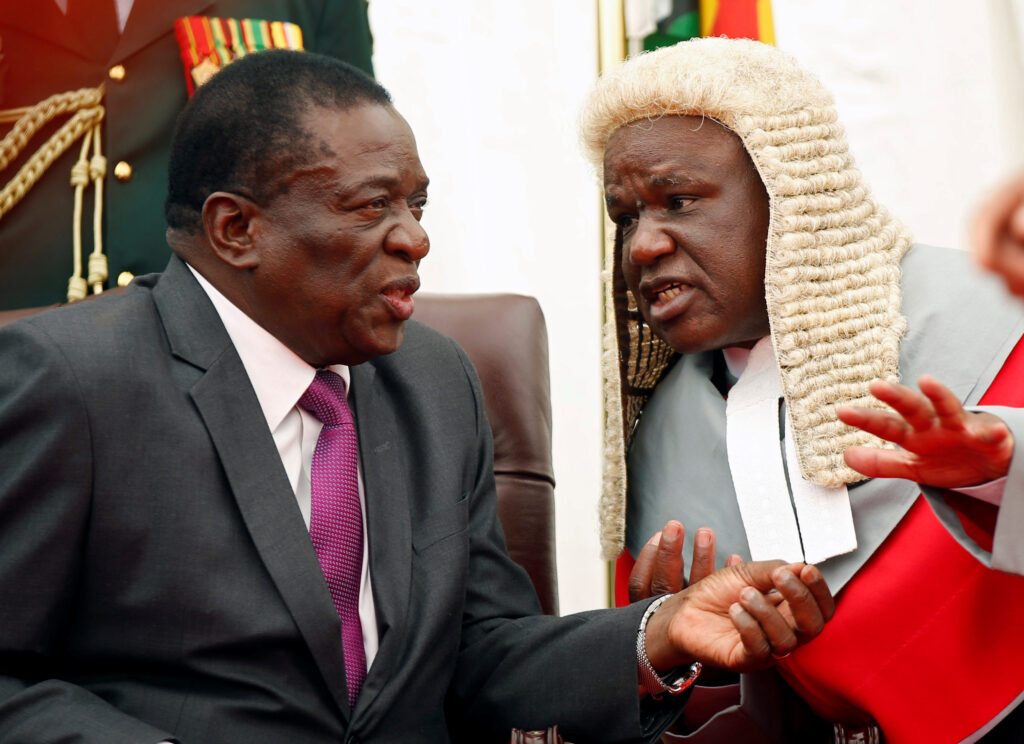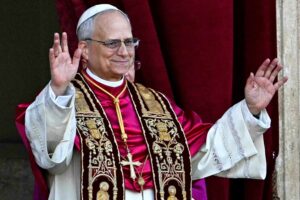CLAIM: Incumbent Malaba benefited from a term limit change. Courts set a precedence (sic).
SOURCE: Account on X (formerly X)
VERDICT: False
There have been recent allegations on President Emmerson Mnangagwa’s ZANU PF urging him to go for a third term, when the current one ends in 2028.
Many articles have been written on the constitutional hurdles that stand in his way, here and here.
However, those who suggest that the constitutional hurdles are surmountable, cite the case of Chief Justice Luke Malaba as having set a precedent, here and here.
Another X user thinks the Malaba case has been set as a precedent to change limits for President Mnangagwa, ‘A precedent was set. Malaba case! Expect the unexpected. Chances are high that ED will seek a third term. Remember ka statement kaya “#2030 ndenge ndichipo” 😂😂 (#2030 I will be here)’.
This is a popular opinion, also shared by this user, ‘You must be joking. What happened with Malaba? They dont care. There wont be any referendum, they will just do what they want and life goes on’.
Age limit or term Limit?
The Constitutional amendment 2 in 2021, Section 186, added an optional 5 years to the previous mandatory retirement age of 70:
The Chief Justice and the Deputy Chief Justice hold office from the date of their assumption of office until they reach the age of seventy years, when they must retire unless, before they attain that age, they elect to continue in office for an additional five years: Provided that such election shall be subject to the submission to, and acceptance by the President, after consultation with the Judicial Service Commission, of a medical report as to their mental and physical fitness so to continue in office.
In 2021, Chief Justice Luke Malaba turned 70. In accordance with the constitutional amendment earlier that year, he elected to continue in office for another 5 years. After presumably ascertaining his mental and health fitness, President Mnangagwa accepted.

Unfortunately, most media houses reported this as President Mnangagwa ‘extending’ Malaba’s term of office, here and here.
At this time, Justice Malaba had already served 4 years as Chief Justice. An extension of term would mean that a Chief Justice’s term had been 4 years and had now been extended to 9 years.
What were the judges’ term limits before and after this ‘extension’?
The term limit for the Chief Justice as part of the Constitutional judges is, and has been, 15 years. This was not changed in any way when the age limits were changed. However, there were those who interpreted the terms and conditions of service that required one to retire at the age of 70 as a term limit.
Musa Kika and the Young Lawyers Association of Zimbabwe and Frederick Mutanda approached the courts concerning the effect of the extension of the retirement age for Constitutional Court and Supreme Court judges by the Constitution of Zimbabwe Amendment (No. 2) Act, 2021 (No. 2 of 2021) in the light of section 328(7) of the Constitution.
The High Court ruled that ‘the extension of the retirement age amounts to extension of tenure. Tenure is defined by both the fixed time and the stipulated retirement ages. In terms of s 328 (7) of the constitution, such an extension of tenure is an amendment to the Constitution. It cannot benefit the persons who held or occupied the office at any time before the amendment. Any extension of the length of time that persons who were judges of the Constitutional Court and Supreme Court prior to the amendment of s 186 through the Constitution of Zimbabwe Amendment (No. 2), 2021 would be a violation of the applicants’ rights as protected by s 56(1) and s 69(3) of the Constitution of Zimbabwe’.
This ruling was challenged at the Constitutional Court, with the government arguing that the amendment changed the retirement age and so did not breach the country’s constitution.
The Constitutional Court in Judgement CCZ 07/21 ruled that the High Court decision had been ‘erroneous’ and ‘misdirected’, stating that, ‘As regards s 186 of the Constitution, a detailed analysis of that section reveals the recognition, throughout its provisions, of a specific distinction between various ages of retirement on the one hand and non-renewable or fixed terms of office on the other. Thus, subss (1), (2), (3) and (5) prescribe “the age of seventy years” as being the standard age of retirement for the Chief Justice, Deputy Chief Justice, judges of the Constitutional Court, Supreme Court and High Court and any other judges. In contrast, subs (2) specifically provides for the appointment of judges of the Constitutional Court “for a non-renewable term of not more than fifteen years”’.
Conclusion
The often repeated claim that, ‘Incumbent Malaba benefited from a term limit change. Courts set a precedence (sic)’ is false. Malaba benefited from a retirement age change not term limit change. The term limit for constitutional court judges is a non renewable 15 years. Malaba had served for 4 years before reaching age 70 and when he opted to continue until the age of 75, it meant that he is set to serve as Zimbabwe’s Chief Justice for a total period of nine years – well below the term limit which was, and remains, 15 years.











